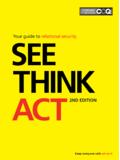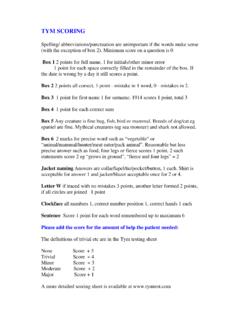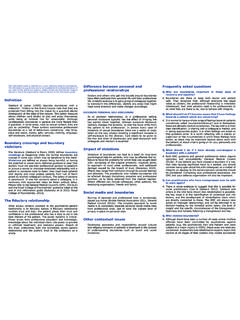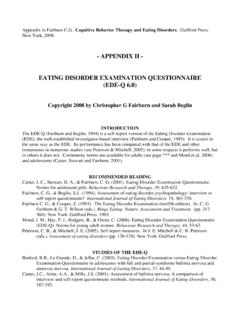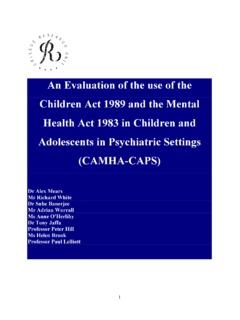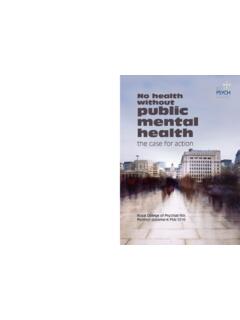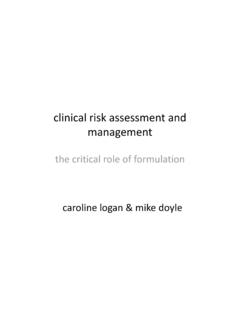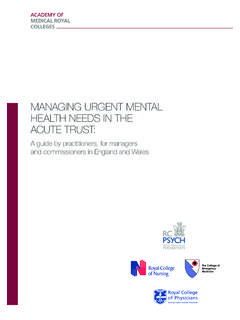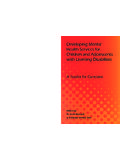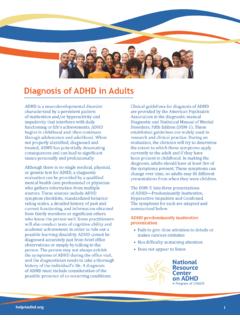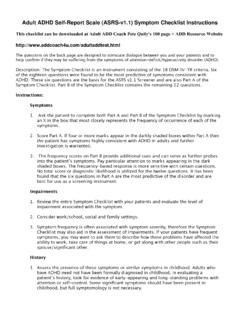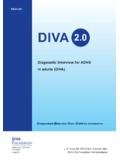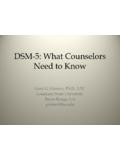Transcription of ADHD in adults: good practice guidelines
1 COLLEGE REPORT adhd in adults : good practice guidelinesRoyal College of Psychiatrists in Scotland 2017 The Royal College of PsychiatristsThe Royal College of Psychiatrists is a charity registered in England and Wales (228636) and in Scotland (SC038369).iiiContentsContributors 1 Aims and structure 2 Background 3 adhd as a diagnosis in adults 5 General principles in assessing and managing adults with adhd 6 Pre-referral recommendations 7 Referrals to mental health services 8 Assessment 11 Comorbidity 15 Specific patient groups 16 Management of adhd 19 Service design 25 Training 27 References 28 Appendix 1: Transition guidance 32 Appendix 2: Developmental history 37 Appendix 3: Comorbidity 41 Appendix 4: Self-help information 44 Appendix 5: Tools 451 ContributorsThis document was written by the Royal College of Psychiatrists in Scotland special interest group in adhd , co-chaired by Marie Boilson and Prem Shah.
2 Members of the advisory groupMarie BoilsonPrem ShahIshbel MacIverMichelle QuilterNeil MassonChristine SutherlandRaj BadialJohannes LeuvenninkSheila HowittFionnbar LenihanIn memoriamThis report is dedicated to the memory of Johannes Leuvennik. 2 The aims of this publication are to: zprovide psychiatrists with practical, evidence-based guidance in managing adults with attention-deficit hyperactivity disorder ( adhd ) in mental healthcare settings zprovide those involved in designing mental healthcare services in Scotland with a consensus view on how best to meet the needs of adults with guidance draws on evidence summarised in established docu-ments, including the National Institute for Health and Care Excellence (NICE) clinical guideline CG72 (NICE, 2008), the British Association of Psychopharmacology s guidelines (Bolea-Alama ac et al, 2014) and the European Consensus Statement (Kooij et al, 2010 ).
3 This is a compact reference guide for those working with this patient group. It is not a substitute for the more extensive guidelines referred to above or for formal clinical there is insufficient trial-based evidence, our guidance draws from the clinical experience of the psychiatrists of the Royal College of Psychiatrists in Scotland Adult adhd Working guidance has been developed by the Royal College of Psychiatrists in Scotland to assist psychiatrists and those designing services in Scotland with providing evidence-based care for adults with adhd . It is thus written to be applicable to the Scottish health system. However, the evidence, principles and approaches it sets out may also be relevant for other jurisdictions of the and structure3 BackgroundCommitment 33 of the Mental Health Strategy for Scotland 2012 2015 (Scottish Government, 2012) undertakes to develop specialist capabil-ity with respect to those with neurodevelopmental disorders (NDDs), including adhd , in adults .
4 Scottish health boards therefore need to address this emergent clinical and educational need. The evidence base for treatment of adult adhd is evolving. zThere is strong evidence that adhd -related impairments persist into adulthood. zTwo-thirds of children diagnosed with adhd continue to have the full syndrome or are in partial remission beyond the age of 18 (Faraone et al, 2006). zNICE benchmarking suggests that 25 individuals per 100 000 population per year will transition into adult services. zBetween and 4% of British adults may benefit from treatment (Faraone & Biederman, 2005). zADHD is a highly heritable condition (Faraone et al, 2000).Despite this evidence, levels of adult diagnosis and treatment in Scotland are well below expected.
5 In 2009 2010, 773 individuals aged 20 64 were prescribed medications for adhd , representing of the age group. This rose to 1800 individuals ( ) in 2013 2014 (ISD Scotland, 2014). These numbers fall significantly short of the anticipated 4%. In those younger than 20 years of age, in 2009 2010 and in 2013 2014 received adhd medication (ISD Scotland, 2014).The worldwide prevalence of adhd in children is estimated at 5%, with of children meeting criteria for the more severe form known as hyperkinetic syndrome (Polanczyk et al, 2007). This equates to 37 000 and 11 000 children in Scotland, respectively. There are an esti-mated 4539 children and young people with a diagnosis of adhd in contact with specialist services (NHS Quality Improvement Scotland, 2008).
6 This suggests that adhd continues to be underestimated in the Scottish school-age Improvement Scotland (2012) found a dearth of services for adults with adhd , in contrast to the expanding situation in England and is strong evidence that adults with adhd respond to pharma-cological treatments, medication being the first line of treatment in adults (Bolea et al, 2012 ). 4 Not detecting or treating adhd has widespread ramifications for society in terms of family life, education, employment, healthcare and crime. The economic costs should not be underestimated (Kessler et al, 2006).The Royal College of Psychiatrists requires all psychiatrists to be competent in neurodevelopmental assessment (Royal College of Psychiatrists, 2010).
7 However, a recent survey by the Royal College of Psychiatrists in Scotland revealed an unmet need for training in the assessment of NDDs in adults , including adhd . Of respondents, 32% of psychiatrists were not confident in assessing adhd and other NDDs, and 67% wanted to have further boards must provide the necessary training opportunities to all relevant clinicians to develop their skills to the appropriate level of competence. All psychiatrists have a fundamental responsibility to ensure an appropriate level of competency in assessing and man-aging NDDs. Not all medications for adhd in adults are licensed. The established expert in managing young people with adhd and the substantial evidence base for use of these agents in adults justifies prescribing on an off-licence basis.
8 We recognise that many psychiatrists are anxious that assessing and managing adults with adhd may involve extra work for them, within a climate of resource austerity in health services. Nonetheless, we strongly recommend that all psychiatrists dealing with adults must be competent in diagnosing and managing adhd . This disorder is common and found in all psychiatric subspecialties, often with comorbidities. It is likely that there are patients on existing case-loads who have undiagnosed adhd . Service delivery needs to be planned to optimise use of resources. There is scope to learn from models employed by child and adoles-cent mental health services (CAMHS) and paediatric services. Some investment will be required, but we do not anticipate that specialist services will be required within all health also recommend establishing a managed clinical network that develops and shares clinical experience, providing expertise that may not be available is one of a number of NDDs.
9 adhd and other NDDs frequently overlap; there is significant comorbidity with autism spectrum disorder (ASD), for example (Gillberg, 1983).An individual s general activity levels, and their ability to pay atten-tion, control impulses and regulate mood, are genetically weighted traits which are present from childhood. These traits are distributed as a spectrum in the population, modified by the environment and changeable with age. adhd represents individuals who are at the extreme end of a spec-trum in terms of degree of inattention, impulsivity and hyperactivity. Not all who are at these extremes have functional impairments or prob-lems, and in certain circumstances these traits can be advantageous to individuals.
10 However, those with adhd are at substantially higher risk of developing secondary problems, particularly other psychiatric illnesses, substance misuse, and forensic, occupational, interpersonal and social problems (Kessler et al, 2006).The need to demonstrate functional impairment or secondary dis-abilities is paramount in defining adhd that may merit intervention; indeed, this forms part of the necessary diagnostic criteria (American Psychiatric Association, 2013). adults have to actively choose to manage their adhd . Some may validly choose not to modify their adhd in spite of apparent negative outcomes. The individual remains responsible for their behaviour irrespective of are parallels between adhd and personality disorders both are trait-based, dimensional and represent individuals at one end of a spectrum.
